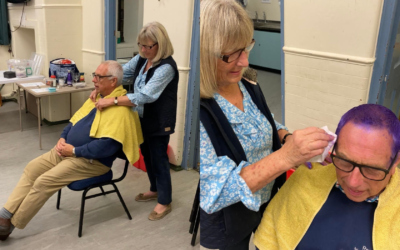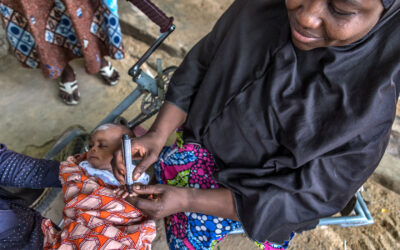On the banks surrounding Stoke Mandeville Stadium’s athletics and para-athletics track, groups of volunteers from Rotary and WheelPower joined forces to plant 25,000 purple crocus corms for World Polio Day.
These were just a portion of the 2.5 million corms planted around the country by Rotary clubs in collaboration with members of their local communities, which will bloom into splashes of purple next spring.
Rotary’s formal partnership with WheelPower was born out the London 2012 Paralympic Games to provide support and equipment for disabled people keen to engage in sport, but connections run much deeper.
Sir Ludwig Guttmann, known as the father of the Paralympics movement and founder of WheelPower, first pioneered the rehabilitation of patients who suffered from paralysis as a result of contracting polio in the 1940’s and was himself a member of Rotary.
Leah Lewis, Community Fundraiser explained, “Guttmann was a neurologist at Stoke Mandeville hospital, and Rotary members helped to fund the building of Stoke Mandeville Stadium, so there’s a fantastic connection there.”
“He set up rehabilitation programmes for people who had contracted polio to help them to live happier and healthy lives. That’s a legacy we continue here at WheelPower.”
I think we have a responsibility to look after the people for whom the polio vaccine came too late.”
“Activities like this crocus planting are a great way for WheelPower and Rotary to continue that link, working together both nationally and locally.”
Rotary in Great Britain and Ireland President Debbie Hodge was one of the dozens of volunteers who took part, including the local Boys Brigade and Horatio’s Garden.
For Debbie, as a Trustee of WheelPower, this was a particularly exciting day.
“It is important we raise awareness of polio with a new group of people that Rotary doesn’t always engage with; the sporting community.”
“Because of the link between polio and disability, it is great to be doing it here at WheelPower, who support disability sport.”
“The whole synergy between the two organisations in making a difference in our communities is quite crucial.”
“One of the things that sport does for polio, both in the recovery phase and in the long term, is enable people to live a fuller life. Sport gives people skills for their everyday lives, as well as the camaraderie and feel good factor.”


Debbie Hodge has a helping hand planting some of the 25,000 crocus corms from grandson Charlie
The true impact of polio was shared with the volunteers in a rousing and impactful speech from polio survivor Colin Powell, a Rotary member and Purple4Polio Ambassador who also works with the British Polio Fellowship.
“I do think we have a responsibility to look after the people for whom the polio vaccine came too late.”
“When my first grandchild was born 22 years ago, we were advised to take the polio vaccine because we could come in contact with the live virus through the contents of his nappy.”
Activities like this crocus planting are a great way for WheelPower and Rotary to continue working together nationally and locally.”
“I had the sugar lump, and on that lump was two droplets of vaccine, which I took.”
“I was a mess for several weeks thereafter thinking how different my life would have been had the vaccine been available to me.”
“That’s why I’m passionate that the fight goes on to eradicate polio globally and ensure that children born today don’t have a life with the extra burdens that this disease has given me.”
Rotary’s progress to date has been significant, reducing the number of cases worldwide by 99.9% over the last three decades from over 1,000 cases per day to just 22 last year.










